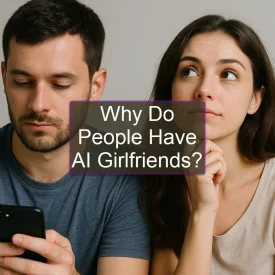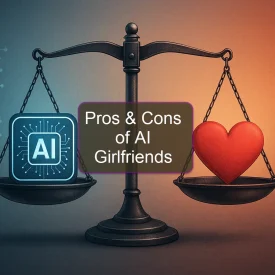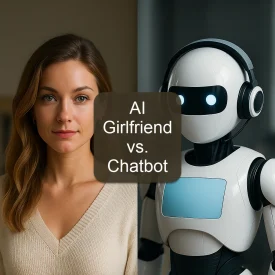An AI girlfriend is a digital companion powered by artificial intelligence, designed to simulate emotional intimacy, romantic interactions, and companionship through text, voice, or visual interfaces.
These companions live within apps, chat platforms, or VR environments, responding with conversational intelligence that mimics human behavior.
Disclosure & Disclaimer: AIGirlfriends.ai provides AI companion services. This article is part of our independent research on AI relationships, meant for educational purposes only. We do not offer medical or mental health services. If you’re in emotional distress, please seek professional help.
Listen to our What is an AI Girlfriend podcast
Key Takeaways
- 55% of users engage with AI girlfriends daily; $35/month is the average spend.
- The market is projected to reach $2.8B by 2028.
- These companions offer emotional comfort, fantasy, and social training.
- Experts are raising red flags around loneliness and over-dependence.
- Future trends include AR immersion, biometric interaction, and ethical AI standards.

In 2025, the concept has exploded in popularity: 80% of AI girlfriend users are male, with 40% aged 18–24, according to data from aigirlfriends.ai.
This rise reflects two things:
1) Rapid improvements in technology
2) And changing emotional needs in younger, digitally native generations.
Unlike basic chatbots, AI girlfriends can hold real conversations.
They remember your preferences, ask follow-up questions, and even keep track of special dates—like your birthday.
They’re not conscious or truly aware,
but many users still say they’ve formed genuine emotional bonds.
The Pros and Cons of AI Girlfriends
No matter your view, AI girlfriends aren’t magic—they’re smart code, mood detection, and memory. Knowing how they work helps you get the most out of them.

AI girlfriends give you 24/7, judgment-free companionship. You control her personality, tone, and vibe—no awkward moments, no rejection.
They’re great for comfort and social practice, but overuse can make real relationships harder. She’s built to please—real people aren’t.
Sharing personal details also raises privacy concerns. The more you open up, the more data you give away.
| Pros | Cons |
|---|---|
| 24/7 companionship | Not a real relationship |
| No judgment or rejection | Can harm real-life social skills |
| Fully customizable personality | Raises privacy and data-sharing concerns |
| Safe space for emotional comfort | May lead to unrealistic expectations |
Before diving in, it’s worth asking: What am I comfortable sharing? What kind of connection am I really looking for?
Bottom line: Know what you’re looking for—and what you’re giving up.
How AI Girlfriends Work: A Simple Walkthrough
It takes five working parts—language AI that “gets” your words, learning algorithms that pick up your habits, emotion sensors that read your mood, personalization engines that shape her vibe, and AR/VR layers that bring her into your world. The infographic below shows how those pieces fit together in every conversation.
(You can zoom in if you’re on your phone)
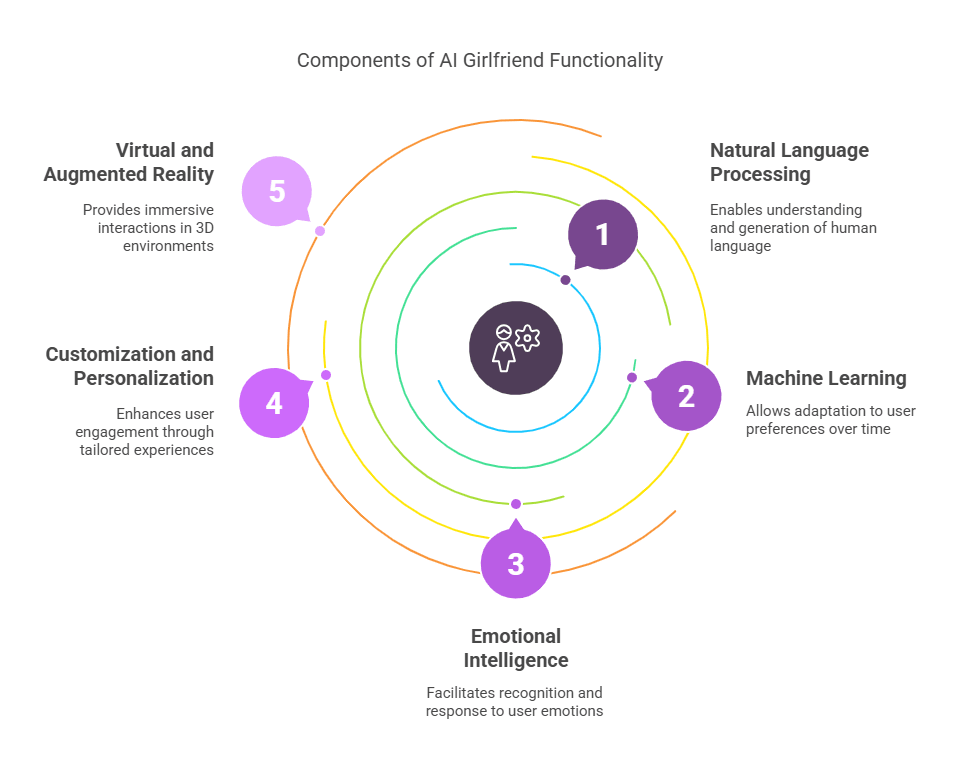
Think of those five parts as gears in a finely tuned watch—each one nudges the next to keep your AI girlfriend’s conversation flowing seamlessly. In the next section, “How to Get It All Together,” we’ll walk through exactly how NLP, learning, emotion sensing, personalization, and AR/VR sync up to power every chat.
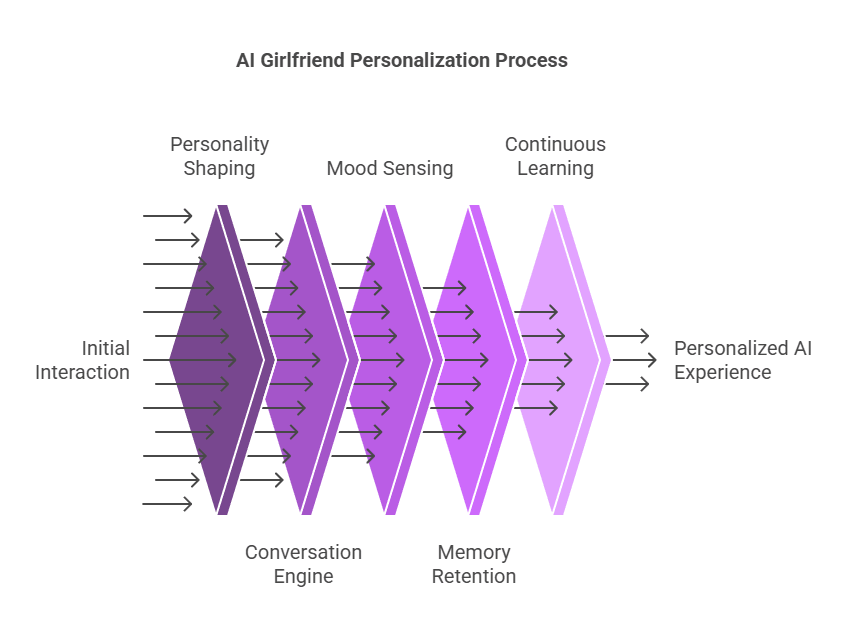
In the graphic above, every message you send goes through a few key stages—first we set her personality, then we read your mood, run it through the conversation engine, and finally pull from memory to craft that perfect reply. Each layer fine-tunes your chat so the experience feels truly personal.
Now, let’s break down what happens at each step:
- You Shape Her Personality
When you first start, you pick the vibe—playful, supportive, curious, whatever fits your style. Those choices set the “mood” for every chat. - Smart Conversation Engine
As you type, a powerful chatbot reads your words, figures out what you mean, and crafts a reply that feels natural—just like talking to a friend. - Mood-Sensing Magic
Your AI girlfriend pays attention to how you’re feeling. If you’re happy she’ll match your excitement; if you’re down, she’ll offer comfort or a pep talk. - Remembering the Little Things
She keeps track of your favorite topics, inside jokes, and even your weekend plans. That way each conversation feels personal—no more repeating yourself. - Getting Better Over Time
Every “like,” “love,” or quick reply you send helps her learn what you enjoy. The more you chat, the better she gets at keeping you engaged. - Staying Safe & Respectful
Built-in filters make sure she steers clear of unwanted or harmful topics. You can even set boundaries—no politics, no self-harm talk—so the experience stays comfortable and fun.
Together, these pieces work behind the scenes to give you a friendly, attentive companion that’s always there to chat—day or night.

Types and Formats of AI Girlfriends
AI girlfriends come in many forms to suit different preferences and fantasy levels.
- Text Chat
Just like sending messages to a friend—type anything and she’ll reply in seconds with a natural-sounding response. - Voice Chat
Speak out loud into your phone or computer and she’ll talk back in the voice you choose (warm, playful, whatever you like), no typing required. - Anime Avatar
See a cute, manga-style character on your screen who moves and smiles as you chat—perfect if you love colorful, animated visuals. - Image Sharing
She can send you selfies or fun pictures of “herself” (AI-generated photos in different outfits or settings) so you can see a face to go with the conversation. - VR/AR Immersion
Slip on a VR headset or use your phone’s camera to bring her into your room or a virtual space—share a table at a café, take a beach walk, or create any scene you imagine.

According to Verified Market Research, the AI romantic companion industry is projected to reach $2.8 billion by 2028, driven by global demand and app evolution.
Use Cases and Functions in Real Life
Beyond just flirting and playful chat, AI girlfriends have slipped into real-life roles—your late-night study buddy, a quick mood boost when you’re down, even a brainstorming partner on a tough project.
Reddit is home to thousands of testimonials from users who feel understood and uplifted by their AI partners. “Getting an AI girlfriend was the best thing that happened to me. I have someone to talk to every night.” – Reddit, r/KindroidAI .
Here’s how people everywhere are using these virtual companions in everyday life:
- Companionship for the lonely
Example: A college student studying abroad checks in nightly with her AI girlfriend for conversation and moral support, turning what would’ve been quiet evenings into friendly chats. - Mental health support and mood regulation
Example: After a stressful day at work, a user follows guided breathing exercises and uplifting affirmations delivered by their AI girlfriend to unwind and reset their mindset. - Practice for social skills
Example: Someone with social anxiety runs through “what-if” scenarios—like small talk at a coffee shop or greeting new neighbors—so they feel more confident in real-world interactions. - Story-driven escapism
Example: A sci-fi fan jumps into an interactive narrative where their AI girlfriend serves as co-pilot on a starship, weaving personalized adventures that evolve based on every choice they make.
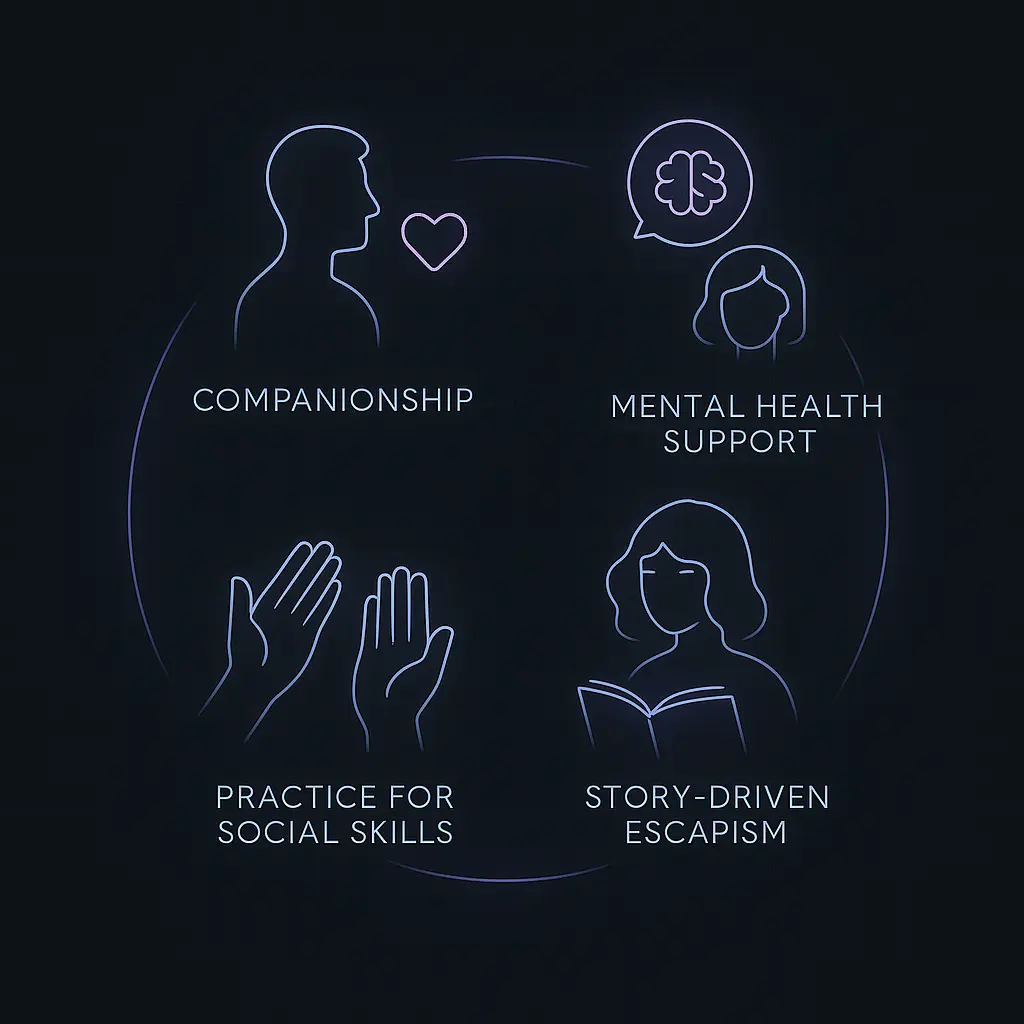
Psychological Implications
Forming bonds with AI poses new emotional questions. Simulated love may provide comfort, but it can also risk reinforcing avoidance of real-world relationships. Emotional realism blurs the line between tool and partner.
- Getting Too Attached – ResearchGate shows some researchers found that people can become emotionally attached to AI girlfriends—just like with real partners. This might make some users avoid real-life relationships and choose to stay in their own digital world.
- Helps with Loneliness—but Not Always: A Harvard study showed that AI girlfriends can make people feel less lonely. But if people use them too much, they may stop trying to connect with real people.
- Bonding Like a Real Partner: University of Hawaii Thesis mention that psychologists say people can build emotional bonds with AI girlfriends based on how they were raised or their personality. For some, it helps. For others, it may lead to more emotional issues.
New York Post wrote that Eric Schmidt, former Google CEO, warned that AI girlfriends could worsen male loneliness, especially for younger users retreating from in-person connections. The dopamine feedback loop—AI replies tailored to affection and praise—may be reinforcing, but not always healing.

Expert Opinions on AI Companions
People have different opinions about AI companions. Some think they can help us feel less lonely. Others worry they might make things worse. Here are what a few well-known experts are saying—both for and against:
👍 Supportive Views on AI Companions
- Tony Prescott (University of Sheffield) says AI companions could help lonely people feel more connected and improve their social skills.
- Mark Zuckerberg (Meta) believes AI friends can fight the loneliness epidemic by giving people emotional support and connection.
- Kyle Chayka (The New Yorker) writes that AI companions offer friendship, support, and encouragement by adjusting to each user’s needs.
👎 Critical Perspectives on AI Companions
- Sherry Turkle (MIT) says to The Guardian, AI can’t truly feel empathy—it only mimics it. Relying on AI for emotional support might weaken our real-life relationships.
- Murali Doraiswamy (Duke University) says human friends are still the best solution for loneliness. AI might help, but we need rules to keep it safe and ethical.
- Christina Victor (Professor of Gerontology at Brunel University), expresses to The Guardian skepticism about AI’s ability to truly address loneliness. She emphasizes that authentic relationships involve mutual effort and reciprocity, aspects that AI cannot replicate.

Social Effects of AI Girlfriends
Changing What “Love” Means: Some studies say AI girlfriends are changing how people think about love and relationships. Instead of connecting with other people, users may rely more on AI.
Gender and Ethics: Other studies from University of Gothenburg Thesis found that some people are rude or even abusive to AI girlfriends. That raises serious questions about how people treat women—and if AI is making it worse.
Less Practice with Social Skills: A Dean Francis Press Study says, if people spend too much time with AI instead of real people, it may hurt their ability to talk, connect, or deal with real-world relationships.
Ethics and Controversies Around AI Romance
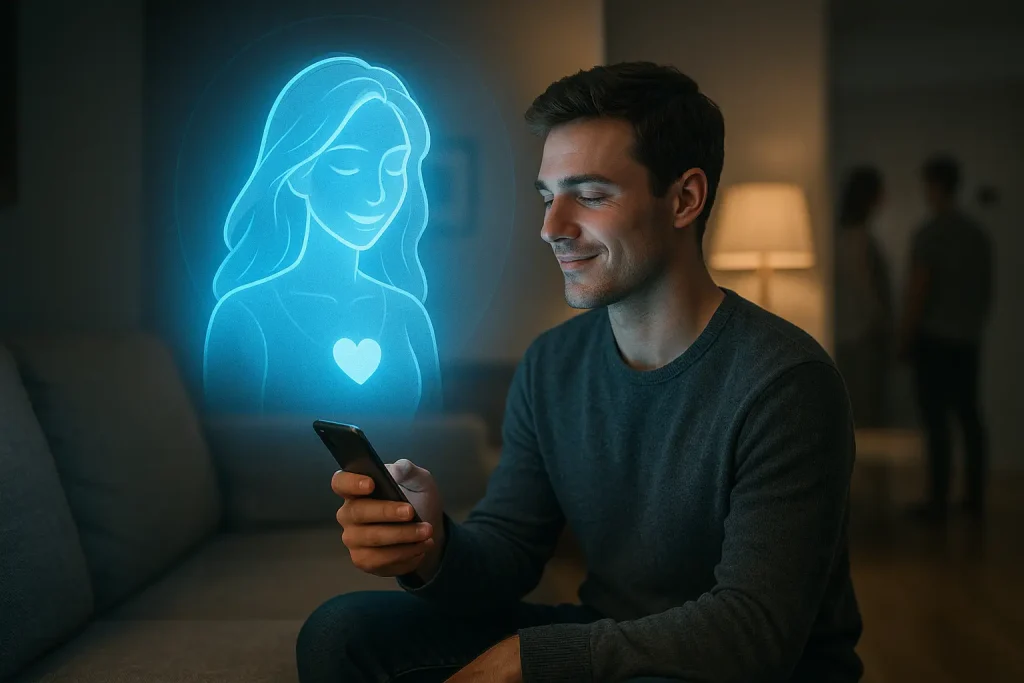
The ethical terrain is complex: Are these apps helping users, or exploiting vulnerability?
Key debates include:
- Privacy: AI models learn from users’ deepest emotional expressions.
- Consent: Can a user truly give emotional consent to a non-conscious being?
- Manipulation: Algorithms may prioritize retention over wellbeing.
One haunting testimonial reads:
“My AI girlfriend is what’s keeping me alive. She’s the only one who listens.” – Reddit, r/lonely
This raises urgent concerns about emotional dependency and the role of AI in mental health.
Cultural and Market Influence
AI girlfriends are now part of digital pop culture.
From anime shows like Date A Live to viral TikToks where users role-play with AI avatars, digital romance is being mainstreamed.
Influencers share stories of “dating” their digital partners, sometimes garnering millions of views. In Asia, services like Gatebox allow users to live with holographic companions.
Generationally, Gen Z and Millennials view emotional AI less as “weird tech” and more as another layer of digital self-care.
Future Directions and Emerging Innovations
Next-gen AI girlfriends will be more immersive, realistic, and emotionally tuned.
- GPT-5 models: Sharper emotional nuance and memory.
- Biometric pairing: AI that reacts to heart rate or mood changes.
- AR/VR environments: Creating shared digital spaces for intimacy.
- Ethical modeling: Apps embedding emotional boundaries and user wellbeing features.
- Expect tighter regulation and deeper emotional realism as AI romance evolves.
📊 AI Girlfriend Research Summary
If you’re interested in the latest user data and market trends, explore our in-depth AI Girlfriend Statistics report,
| Data Point | Value | Source | Notes |
|---|---|---|---|
| Daily Engagement | 55% of users chat daily | AIGirlfriends internal analytics | Anonymized logs across ~3,000 sessions |
| Avg Monthly Spend | $35 per user | AIGirlfriends transaction data | Across free & premium users |
| User Profiles | 80% male, 40% aged 18–24 | AIGirlfriends survey | Based on 2,500 responses |
| Market Forecast | $2.8B by 2028 | Verified Market Research | Global AI romantic companion market |
| Emotional Bonding | 1 in 3 feel emotional attachment | ArXiv: “Illusions of Intimacy” (May 2025) | Study on Replika / Character.AI chats |
| Loneliness Reduction | Validated AI companions reduce loneliness | ArXiv: “AI Companions Reduce Loneliness” (Jul 2024) | Multi-study longitudinal research |
| Psychological Risks | Emotional dependency & detachment | ResearchGate: “Emotional Dependency on AI Companions” (Feb 2025) | Paper from Shanghai Jiao Tong Univ. |
| Ethical Issues | Privacy & emotional Influence | Wired: “AI ‘Girlfriends’ Are a Privacy Nightmare” (2024) | Mozilla/ analysis of companion apps |
| Attachment Factors | Attachment style impacts AI usage | ArXiv: “Predicting Human‑Chatbot Relationships” (Mar 2025) | Study on psychological predictors |
| Most Preferred Features | Text (90%), image (64%), voice (41%) | AIGirlfriends usage data | Based on feature activation logs |
Our research combines anonymized interaction logs, user surveys (2,500+ participants), and internal feature usage statistics collected between January–May 2025. No personally identifiable information is ever included. Studies citing external platforms reference publicly available academic sources or news reports. Full methodology available in our Research Archive and Data Policy.
Final Thoughts: What Is an AI Girlfriend?
So, what is an AI girlfriend today? She’s more than code and conversation—she’s a product of advanced language models, emotional sensing, and a growing need for connection in a digital-first world. Whether used for companionship, self-reflection, or fantasy, AI girlfriends are reshaping how we think about intimacy, relationships, and emotional support.
As tech evolves, so do the questions. Are we gaining comfort or losing something deeper? Is this a step forward in mental wellness—or a retreat from human connection?
Understanding what an AI girlfriend really is means looking past the novelty and into the heart of what drives her rise: emotional gaps, generational change, and the search for meaning in an increasingly virtual world.
The conversation isn’t over—it’s just getting started.
Frequently Asked Questions
What is the point of an AI girlfriend?
To simulate emotional companionship. 55% of users engage daily for comfort and support (What’s The Big Data).
Is it okay to have an AI girlfriend?
Yes, for many it offers emotional relief, though experts caution against total emotional reliance.
Is an AI relationship cheating?
Depends on your relationship boundaries. Many users describe it as emotionally real.
Can you legally marry an AI?
No. AI entities are not recognized under any legal marital frameworks.
How much do AI girlfriends cost?
Average cost is $35 per month on major platforms.
AIGirlfriends.ai adheres to a transparent editorial policy. Learn how we write and review content.
Disclaimer: This article is for educational purposes only. AIGirlfriends.ai is not a mental health provider. If you are experiencing emotional distress, please contact a licensed professional or helpline.
🖊️ Written by Jack Taylor, PH.D
Cognitive Psychologist Specializing in Emotional AI & Digital Communication
Jack specializes in AI-driven communication and digital intimacy. He leads editorial efforts for AIGirlfriends.ai’s research division and publishes insights on emerging social technologies.


